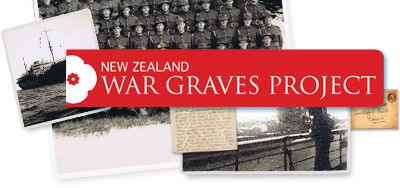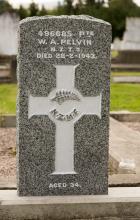Speech Notes: Hon. Max Bradford, Minister of Defence.Saturday 28 Feb 1998 11.30 am :
Memorial Scroll Presentation to the family of Walter Pelvin, New Zealand guard killed during the Japanese riot at Featherston POW Camp 1943
Your Worship, councillors, members of Private Pelvin's family and the Featherston community.
I am honoured to be asked to make a presentation to the family of Private Pelvin. Although there was no fighting in New Zealand during World War II, there more than 1,300 war graves spread across the country. of men and women who died during training, through accidents, or in hospitals from injuries they received in fighting and memorials like the one here to Private Walter Pelvin, who 55 years ago today, died here at the age of 34 in the service of his country.
The Prime Minister of the time, the Rt Hon Peter Fraser informed the country that:
“A serious disturbance occurred in a Prisoner of War Camp following the refusal of a group of 250 Japanese prisoners to obey the orders of the camp authorities. The prisoners were armed with stones, tools and improvised weapons, and they rushed a small group of guards, ignoring a warning shot by the officer in charge.
The guards were forced to open fire and tragically 48 prisoners were killed and 63 wounded. Two officers and five of the guard were injured, one guard having since died.
That Guard Private Pelvin, passed away at Greytown three days after being injured by the ricocheting gunfire. The story is not well known.
Four compounds housed the 800 or so Japanese POWs. 500 in Number 1 compound were non-fighting labourers, resigned to sitting out the war in the camp. Numbers 3 and 4 compounds held small groups of officers or prisoners.
But on that hot February day Number 2 compound housing 290 combat trained Japanese sailors also contained two officers who had slipped out of their compound un-noticed and were agitating the sailors to riot. At 8:30 in the morning the prisoners, who had taken kitchen knives and tools, refused to parade for working duty. By 9.30, New Zealand NCOs and soldiers were formed in a double line facing the sullen prisoners 15 metres away. Attempts to remove the two Japanese officers by unarmed guards led to removal of just one of them. A second attempt failed, as did a third. The remaining Japanese officer, Lieutenant Adachi, remained hid amongst his sailors. The guards withdrew but the situation remained tense.
Two hours later the camp commandant feared the disobedience would spread and worsen. The Adjutant called for Lieutenant Adachi to surrender. His refusal was answered with a warning shot from the adjutant's revolver over the prisoners heads.
The prisoners responded with a hail of stones. The adjutant shot and wounded Adachi in the shoulder and the 250 prisoners armed with knives and crude weapons yelled with rage and charged the 34 guards. The New Zealand guards had no choice but to open fire. The shooting lasted only 30 seconds, and when the chaos cleared 48 were dead.
It later became clear from the prisoner's preparation of weapons that they fully intended to overpower the guards, seize their rifles and escape. A powerful group of 250 trained and armed Japanese loose in New Zealand would have had even more tragic consequences. The guards took the right action, and held fast to their duty.
I sometimes talk of duty and service to the nation when being interviewed by journalists about Defence. Unfortunately service to one's country, one's community, or even to one's fellow man is a concept that often doesn't receive enough attention in today's modern culture.
The Government’s recent decision to send our young servicemen and women to the Gulf and into what we thought might become international military action was not easy to make. These decisions are not taken lightly or through any political expediency.
I was humbled to see the sense of fellowship amongst the service personnel and their families when I farewelled them last week. I was impressed by the sense of pride and dedication towards the task they have been asked to carry out on the nation's behalf. I saw the same dedication and sense of duty when I visited our personnel helping to restore peace to Bougainville
This same sense of comradeship, loyalty, and sense of duty are values openly displayed in our military, and these are values which Private Pelvin and his fellow soldiers were called upon to exhibit here 55 years ago.
During his service, Private Pelvin was awarded the War Medal and the New Zealand Medal. Because his death was in New Zealand he was not eligible for the Memorial Cross
This Memorial Scroll is a mark of gratitude from the Government and people of New Zealand to the family of Private Pelvin, recognising his death in the service of the nation.


